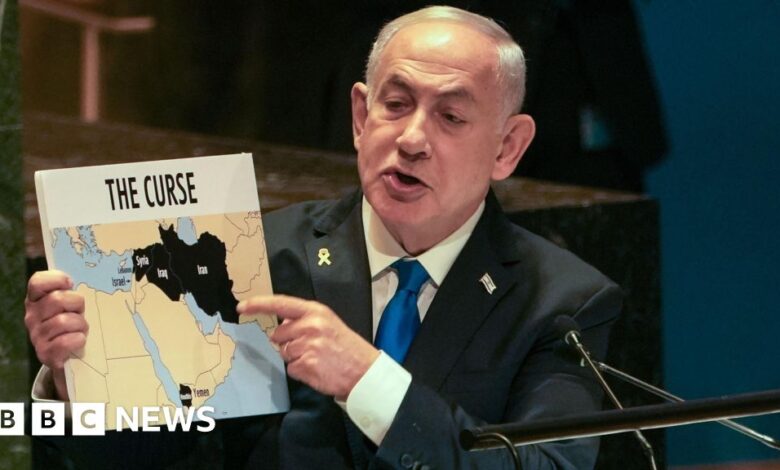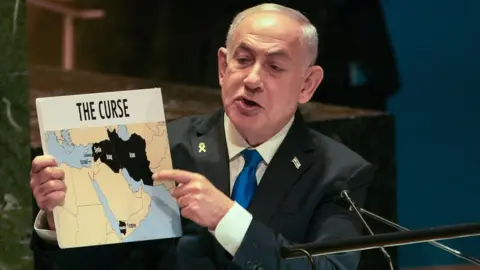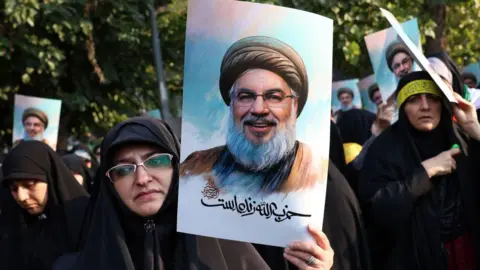Netanyahu in polls recovering from Hezbollah attacks

 EPA
EPABenjamin Netanyahu’s popularity, damaged by a Hamas attack on October 7, has been boosted by his country’s military successes against Hezbollah, a new opinion poll shows. .
A photo has been widely shared of Israel’s Prime Minister in New York ordering the biggest of these – the assassination of the longtime leader of the Lebanese armed group, Hassan Nasrallah.
A poll on Israel’s Channel 12, published on Sunday evening, showed that the Israeli Prime Minister’s Likud party would win more seats than any other party if a general election were held.
However, that did not bring him a general victory. Instead, it showed that the current opposition parties would have more MPs, creating conditions for them to form coalitions.
Fortunately for Netanyahu, his old political rival, Gideon Saar, also joined his uneasy coalition government on Sunday, a move that solidified his position as prime minister.
“We will work shoulder to shoulder and I intend to seek his help in forums that influence the conduct of the war,” Netanyahu said.
Saar will serve as a minister without portfolio and have a seat in the Security Cabinet, which oversees the management of the war against Israel’s regional enemies.
By entering the government with his four-seat party, Netanyahu has a much firmer majority of 68 seats in the 120-seat parliament.
Rumors have circulated in recent weeks that the position of defense minister currently held by the famous, seasoned former army general Yoav Gallant would go to the relatively less experienced Saar.
However, that move appeared to be abandoned when Israel began a series of major attacks against Hezbollah.
For Netanyahu, the composition of the new government weakens the authority of National Security Minister Itamar Ben Gvir. The far-right winger has repeatedly threatened to overthrow the coalition if it goes ahead with a “reckless” deal to end the war in Gaza and bring hostages home or agree to a permanent ceasefire with Hezbollah.
The coalition can now survive without the six seats of Ben Gvir’s Jewish Power party, giving Netanyahu more room to maneuver.
Once considered a rising star of Likud, Saar left the party and became one of the prime minister’s strongest critics, arguing that Netanyahu should not continue serving while fighting corruption charges . He considered his decision to join the government as an act of patriotism, promoting unity.
However, he was harshly criticized by some Israeli commentators, who described him as acting cynically for personal gain.
“Saar’s decision to join the government is certainly a painful blow to the large number of Israelis who believe Netanyahu needs to go, not just because he is on trial for criminal charges, and not just because he is the most corrupt, hedonistic and lying Prime Minister Israel has ever had,” said Yedioth Ahronoth columnist Sima Kadmon.
She sees that his actions “will stabilize and embolden the worst government ever to serve in Israel, to the point that the original date of the next election, October 2026, now appears to be a actual date”.
Certainly, the additional seats could also help address another challenge facing Israel’s most far-right government ever.
At a sensitive time in the war, when the army had an urgent need to expand its ranks, divisions erupted in opposition to the passage of a new military service law.
Israel’s Supreme Court ruled in June that the state must begin drafting ultra-Orthodox Jewish seminary students into the army. Historically, they have been exempt and such a move is strongly opposed by the two ultra-Orthodox parties on which the coalition depends.
Deepening his personal rift with the prime minister, in July Yoav Gallant approved a plan to begin sending draft notices to 1,000 18-26 year olds from the ultra-Orthodox community.
 Getty Images
Getty ImagesA deft political strategist, Netanyahu – Israel’s longest-serving leader – saw his party’s support plummet in polls late last year.
His personal image as “Mr Security” was severely damaged after the October 7 attacks – the deadliest day in Israeli history, when Hamas surprised one of its intelligence agencies. The world’s best and the region’s best-resourced military took hours to react.
By August, however, opinion polls showed the prime minister had begun to bounce back.
That’s despite the fact that the Gaza invasion has become Israel’s longest-ever war with no sign that its goals will be met: the complete destruction of Hamas and the return of its children. Israel’s remaining news about the country.
The latest poll gives Likud up to 25 seats. In total, coalition parties are expected to win 49 seats, while opposition parties will win 66 seats.
According to Channel 12 research, Netanyahu also remains the favorite candidate for prime minister over moderate opposition leader Yair Lapid – with 38% backing him compared to his rival’s 27%.
Much of Israeli politics depends on what happens next as Israel’s multi-front war reaches a critical juncture.
As Israel hints at a ground invasion of southern Lebanon, tens of thousands of Israeli citizens in the north of the country still do not know when they will return home – an official Israeli goal.
If Hezbollah’s main ally, Iran, decides to attack, the consequences will be unpredictable.
In the international arena, Israel is increasingly isolated. International courts are considering whether to put Israel on trial for genocide and have requested arrest warrants for the prime minister and his defense minister on charges of crimes against humanity.
The final test of Netanyahu’s resilience may be yet to come.





